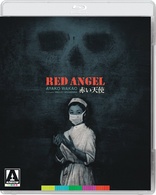Red Angel Blu-ray Movie
HomeRed Angel Blu-ray Movie 
赤い天使 / Akai tenshiArrow | 1966 | 95 min | Not rated | Jan 18, 2022
Movie rating
7.6 | / 10 |
Blu-ray rating
| Users | 0.0 | |
| Reviewer | 4.0 | |
| Overall | 4.0 |
Overview
Red Angel (1966)
When Sakura Nishi is dispatched in 1939 to a ramshackle field hospital in Tientsin, the frontline of Japan's war with China, she and her colleagues find themselves fighting a losing battle tending to the war-wounded and emotionally shellshocked soldiers while assisting head surgeon Dr. Okabe conduct an unending series of amputations. As the Chinese troops close in, she finds herself increasingly drawn to Okabe who, impotent to stall the mounting piles of cadavers, has retreated into his own private hell of morphine addiction.
Starring: Ayako Wakao, Yûsuke Kawazu, Shinsuke AshidaDirector: Yasuzô Masumura
| Foreign | Uncertain |
| Drama | Uncertain |
| War | Uncertain |
| Romance | Uncertain |
Specifications
Video
Video codec: MPEG-4 AVC
Video resolution: 1080p
Aspect ratio: 2.35:1
Original aspect ratio: 2.35:1
Audio
Japanese: LPCM Mono
Subtitles
English
Discs
Blu-ray Disc
Single disc (1 BD)
Playback
Region free
Review
Rating summary
| Movie | 4.0 | |
| Video | 4.0 | |
| Audio | 4.0 | |
| Extras | 3.5 | |
| Overall | 4.0 |
Red Angel Blu-ray Movie Review
Reviewed by Jeffrey Kauffman January 6, 2022Red Angel is a devastating deconstruction of what it's "really" like to be in a war, and while absolutely not in the same quasi-comedic vein (no medical pun intended), it plies some of the same "field hospital" ambience as Robert Altman's M*A*S*H. That well remembered 1970 opus was of course an anti-war film in its own mercurial way, but watching Red Angel, which came out in 1966 and which was probably a relatively startling viewing experience for Japanese audiences at the time, made me wonder about how the American war film, specifically those about World War II, may have morphed through the years in terms of their perspective on some American activities. "War is hell" films from Hollywood's majors were legion even during World War II, and yet they tended to emphasize the heroic nature of our fighters' efforts. Some, like The Best Years of Our Lives or perhaps even Twelve O'Clock High, sought to delve into some of the psychological (and, in the case of the Wyler film, physical) wounds suffered by combatants, but, again, things were treated in an almost hagiographic fashion. A number of films that appeared in the post- World War II era like Home of the Brave and The Men, continued to peel back the scab covering all sorts of wounds engendered by war, both mental and physical, but there was still an underlying premise about the nobility of the fight itself, something that is distinctly lacking in both Red Angel and films like M*A*S*H (which, not to state the obvious, was about Korea). In that regard, it may be downright surprising to realize that we "forward thinking" Americans didn't really start questioning some of the behaviors of American troops in World War II in cinematic depictions of the fracas until at least the mid to late fifties or early sixties, really not that much before Red Angel was released. And perhaps even more saliently, and as one of the supplements on this disc points out (in a somewhat different context), it wasn't until 1980 and films like Samuel Fuller's The Big Red One that American films may have started to get "real" in terms of an honest reassessment of some American activities.
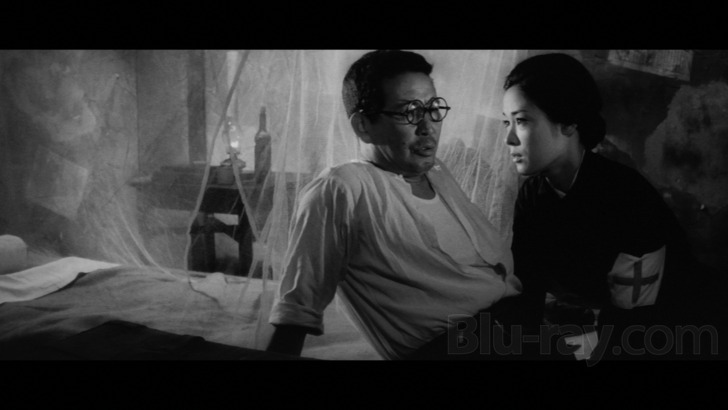
Tony Rayns kind of cheekily discusses what he calls the "Marvin Gaye style" sexual healing engaged in by focal character, a Japanese nurse named Sakura Nishi (Ayako Wakao, a kind of muse for director Yasuzô Masumura). The fact that Nishi beds more than one man in this film is perhaps especially provocative in that this intimacy happens after Sakura is brutally raped in a hospital ward by a bunch of male patients. That might make this film ripe for some kind of post-feminist reassessment, but in that regard it's kind of interesting to note that the insert booklet essay by Irene González-López (as opposed to some of the on disc supplements featuring males) overtly places Sakura's behavior within an overall Masumura oeuvre which, in González-López's words, features "excessive characters like Sakura Nishi" whose "individual desires [are] at odds with societal conventions". Taking this general idea and framing it within the context of the so-called "horrors of war", González- López goes on to comment "Nishi's ethical choices may seem bizarre, but they can hardly be said to be more illogical than the overall governing dynamics."
Sakura is an almost Job like character in a way, though she seemingly invites some of her misfortune on herself, albeit perhaps with apparently noble intentions. Her first "mistake", if you can call it that, is in attempting to help her main attacker. Later, she is sent to a horrifying field hospital where she becomes involved with a morphine addicted surgeon named Okabe (Shinsuke Ashida) and (just for good measure) one of Okabe's amputees, an armless man named Orihara (Yûsuke Kawazu). Within this almost soap operatic series of relationships, Masumura doesn't shirk from some almost unbearably graphic imagery of damaged limbs being severed from wounded soldiers' bodies (and then dumped into barrels), and with the doctors and nurses covered head to toe with the blood of their patients. If Sakura is thought of as the "angel" of the title, Masumura seems to suggests she may be consigned to purgatory at best, and probably more appropriately hell.
Red Angel Blu-ray Movie, Video Quality 
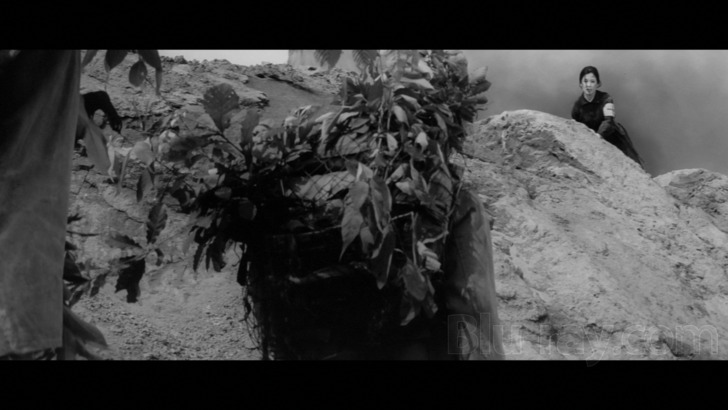
Red Angel is presented on Blu-ray courtesy of Arrow Video with an AVC encoded 1080p transfer in 2.35:1. Arrow's insert booklet contains only the following fairly generic verbiage about the transfer:
Red Angel / Akai tenshi is presented in its original aspect ratio of 2.35:1 with mono sound. The High Definition master was produced and supplied by Kadokawa, with additional grading by Arrow Films at R3Store Studios, London.While there are a few passing signs of age related wear and tear, including some noticeably unstable frames during the very opening seconds of the credits, and a few nicks and blemishes later in the presentation, this offers a generally lustrous accounting with secure contrast of the film's intentionally shrouded cinematography by Setsuo Kobayashi. The film only occasionally ventures outside, and those few moments provide welcome figurative breaths of fresh air since so much of the film seems to take place in the hellish confines of a claustrophobic surgical ward. Black levels are generally impressive, though they may also contribute to moments where shadow definition is minimal, if perceptible at all. Detail levels are also very good to excellent, with potential trouble areas like the mosquito netting surrounding Nishi and Obake in several scenes resolving without any major issues (you can see it overlaying the image in screenshot 15 and in the background in the upper left of the frame of screenshot 19). There some mild fluctuation in the tightness of grain resolution (some of the brief outdoor material can look a little clumpy).
Red Angel Blu-ray Movie, Audio Quality 
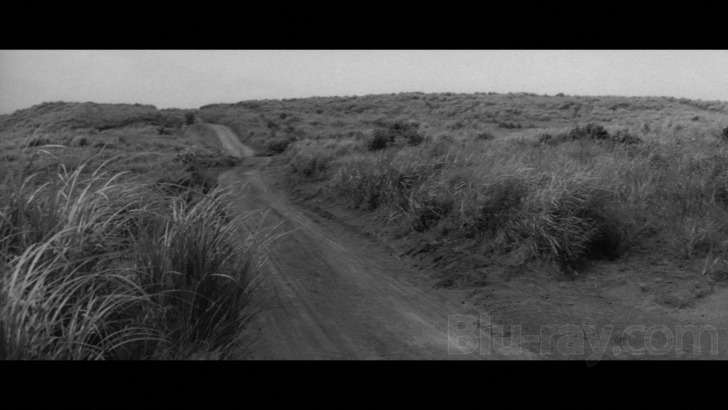
Red Angel features an LPCM Mono track in the original Japanese. The film isn't really a "war picture" in terms of providing explosive battle scenes and the like, but this unavoidably narrow track manages to handle some of the more cacophonous moments, like the chaotic field hospital sequences, without any issues. Ostensibly quieter moments involving what amount to "two hander" scenes typically between Nishi and one of the male supporting characters also are rendered without any problems. Dialogue comes through cleanly and clearly, and I noticed no real signs of any age related wear and tear. Optional English subtitles are available.
Red Angel Blu-ray Movie, Special Features and Extras 
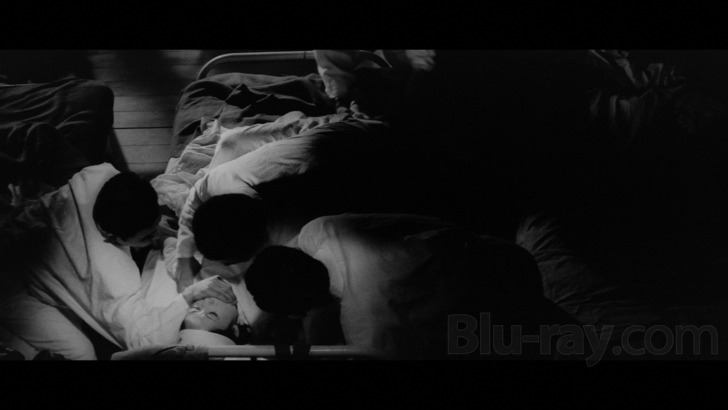
- Commentary by David Desser
- Introduction by Tony Rayns (HD; 11:59) is another interesting overview from Rayns.
- Not All Angels Have Wings (HD; 13:51) is a great video essay by the estimable Jonathan Rosenbaum, who kind of sweetly seems to think he needs to introduce himself.
- Original Theatrical Trailer 1 (HD; 1:18)
- Original Theatrical Trailer 2 (HD; 2:19)
- Image Gallery (HD)
Red Angel Blu-ray Movie, Overall Score and Recommendation 
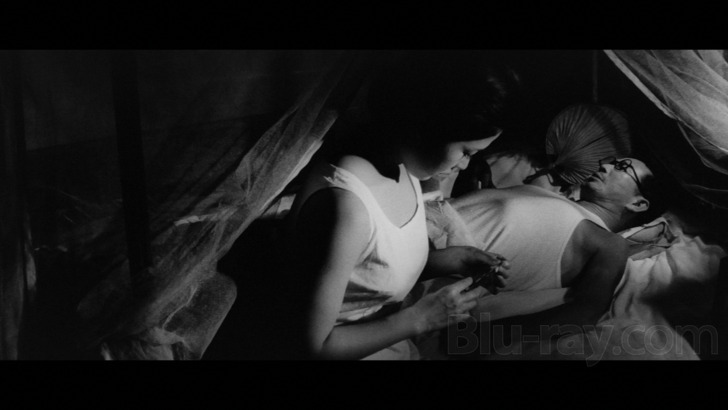
As Irene González-López mentions in her really interesting essay included in this release's insert booklet, perhaps due to the absolutely disturbing imagery of severed limbs in one unforgettable sequence, Red Angel was almost intentionally ignored in Japan for a while, which may point out a certain irony in my whole discussion above about war films taking their home countries to task for various behaviors. That said, this is a really devastating account not just of the horrors of war, but maybe more saliently Man's inhumanity to Man, which is not necessarily limited only to war. Arrow, which has been curating Masumura's film with some care, provides another release with generally solid technical merits and some outstanding supplements. Recommended.
Similar titles
Similar titles you might also like

The Front Line
고지전 / Go-ji-jeon
2011

Fires on the Plain 4K
野火 / Nobi
1959

City of Life and Death
南京!南京! / Nanjing! Nanjing!
2009

Operation Red Sea
红海行动 / Hong hai xing dong
2018

Ballad of a Soldier
Баллада о солдате / Ballada o soldate
1959

Westfront 1918
Westfront 1918: Vier von der Infanterie
1930

The Cranes Are Flying
Летят журавли / Letyat zhuravli
1957

A Hidden Life
2019

Story of a Prostitute
春婦伝 / Shunpu den
1965

Mädchen in Uniform
Girls in Uniform
1931

The Bridge
Die Brücke
1959

Many Wars Ago
Uomini contro
1970

Shame
Skammen
1968

Twenty-Four Eyes
二十四の瞳 / Nijûshi no hitomi
1954

Wild Reeds
Les roseaux sauvages / Slipcover in Original Pressing
1994

Ivan's Childhood
Ива́ново де́тство / Ivanovo detstvo
1962

The Eight Hundred
八佰 / Ba bai
2020

Beanpole
Дылда / Dylda
2019

Senso
Italian and English Versions
1954

A War
Krigen
2015
